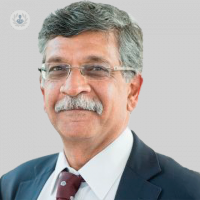How does a neurologist diagnose different types of headache?
Written by:Headaches are a common problem, and together with symptoms of dizziness, are the commonest cause of referrals to a neurology clinic. If you’re getting headaches quite frequently and you or your GP cannot identify an obvious cause, then maybe it’s time to make an appointment to see an expert neurologist about the problem. We asked Dr Hadi Manji, a senior consultant neurologist in London, about the consultation process and how he diagnoses different types of headaches.

How would a neurologist diagnose a headache?
In 99% of patients who see a neurologist with headaches, the diagnosis to find out the underlying cause is made based on the patient’s headache history alone. The basic categories of a headache are acute or chronic. Acute onset headaches, especially if sudden and severe (thunderclap headache) need to be taken seriously as the most important cause to identify and treat is subarachnoid haemorrhage. Other less frequent causes include thrombosis in the veins of the brain or low pressure headache due to leakage of spinal fluid (intracranial hypotension). This can only be done by admission to a hospital and having a CT scan. If a CT scan is normal with no evidence of bleeding, then a lumbar puncture examination needs to be performed. This is where a needle is inserted between two lumber bones (in the vertebrae) to remove a sample of the fluid that surrounds your brain and spine. This will then be examined under the microscope for evidence of bleeding.
The most common causes of chronic or recurrent headaches are migraine, known as analgesic related headache due to overuse of painkillers, and muscle tension headache. This is a serious condition that is treatable with steroids. In patients over the age of 55 years old presenting with a new onset headache, especially around the temples, might need to be tested for temporal arteritis. If this condition isn’t diagnosed and treated it can result in blindness. Blood tests and also a temporal artery biopsy will need to be performed to confirm the diagnosis.
What questions will the neurologist ask about a patient’s history and symptoms?
The information I try to get from my patients to help me make a diagnosis is:
- the description of the headache pain (throbbing, tightness, scalp tenderness)
- where the pain is located
- if there are any associated symptoms e.g. nausea, sensitivity to light, noise and smells
- if there are any alleviating or exacerbating factors
- what the patient takes for the pain
- if the patient knows any triggers for the headache e.g. stress, relief from stress, dehydration, hunger, alcohol, etc.
Are there any physical examinations in the first appointment?
A detailed neurological examination is always carried out during the first consultation to look for any signs or symptoms of an illness that might be causing the headaches. This includes feeling the temporal arteries, checking the blood pressure, checking the patient’s vision and seeing if a fever is present. Also, a full neurological examination will include fundoscopy to look at the back of the eyes for evidence of raised pressure or swelling due to tumours. The neurological exam also will look for any abnormalities that point to a focus of malfunction in any part of the brain.
What kind of specialist tests might be involved? Is imaging required?
Depending on the outcome of the consultation there may be blood tests and a MRI scan. An MRI scan provides very clear images of the brain without the use of X-rays. This might be recommended if you are getting daily headaches or the CT scan isn’t clear.
How many appointments does it take to get a diagnosis?
Usually, after one consultation a doctor can make a diagnosis and recommendations. If the patient has migraines then they are usually given a trigger list that I have accumulated over 20 years. It’s helpful for patients to keep a headache diary for the next consultation as the treatment options depend on the triggers and frequency of the headaches.
If you feel like you need to see a neurologist about your headaches, then visit Dr Hadi Manji’s profile and make an appointment to see him.


